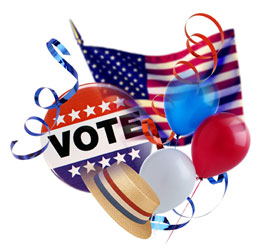

There are several ways that American citizens can participate in the democratic process. Voting is one of the main methods of participation. However, the right to vote has been one of the most contested rights in the history of the United States. At times in our history, the right to vote has been inaccessible to sectors of American citizens.
Luckily, the Framers constructed the U.S. Constitution in a way that allows the government to protect and expand the democratic process. The Constitution can be amended to meet the needs of the American society as it changes. The right to vote is not explicitly written in the Constitution, but it has always been assumed that all American citizens have the right to vote. When the right to vote has been challenged, it has often resulted in a constitutional amendment or a congressional act.
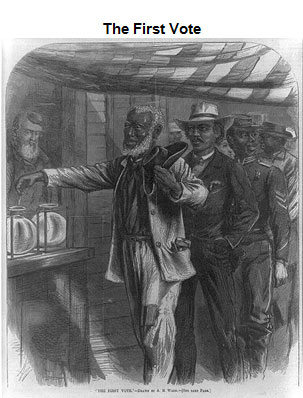
Source: The first vote, Waud, Alfred, Library of Congress
For instance, the 15th Amendment provides the following:
The 15th Amendment
Section 1. The right of citizens of the United States to vote shall not be denied or abridged by the United States or by any State on account of race, color, or previous condition of servitude—
Section 2. The Congress shall have the power to enforce this article by appropriate legislation.
This amendment is one of the Civil War Amendments (13th, 14th, and 15th Amendments.) While the 13th Amendment abolished slavery, and the 14th Amendment provided the protection of equal rights to all freed male slaves, many were still denied the right to vote.
Although the 15th Amendment extended the right to vote to African-American males, they, and others, were still denied the right to vote in many states. For years after the amendment’s passage, African Americans in the South were denied the right to vote by various measures. Barriers, such as literacy tests and poll taxes, kept African Americans from voting. Other tactics, such as intimidation and the threat of violence prevented them from registering to vote.
The practice of denying African Americans, the poor, and other minorities the right to vote would continue for nearly 100 years after the 15th Amendment was passed. The denial of the right to vote limited the political power of those denied for nearly a century. And for nearly a century, the fight for the right to vote was waged.
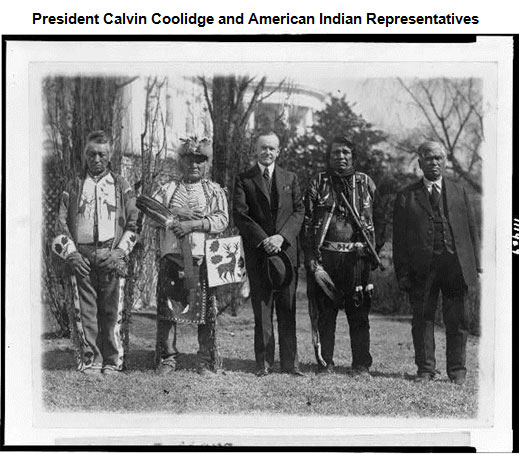
Source: President Calvin Coolidge posed with Natives, possibly from the Plateau area in the Northwestern United States, near the south lawn of the White House, Library of Congress
In the democratic process, citizens elect representatives to represent them in the government. It is expected that these elected representatives work on behalf of the citizens. Through various congressional acts, Congress has worked to expand the right to participate in the democratic process to those who have been denied.
An example of this is Congress’s passage of the Indian Citizenship Act of 1924. For more than 100 years prior to the passage of this act, the United States government had actively worked to limit the rights of citizenship for American Indians.
American Indians with one-half or less American-Indian blood were initially considered citizens. Many American-Indian women married U.S. citizens to gain citizenship. After the Civil War, there were limited attempts to expand citizenship to select tribes. In 1919, citizenship was extended to American-Indian veterans who served in World War I. In 1924, the U.S. Congress moved to extend citizenship to all American Indians.
Although American Indians were granted full citizenship, they were still denied the right to vote in some states.
![]() Each of the following constitutional amendments expanded the rights to vote to American citizens. Read below to learn more.
Each of the following constitutional amendments expanded the rights to vote to American citizens. Read below to learn more.
In 1965, Congress passed The Voting Rights Act of 1965 and President Lyndon B. Johnson signed it into a law. Although there had been a particularly long struggle to secure voting rights, it was the violence that erupted in 1964 and early 1965 that prompted Congress to act.
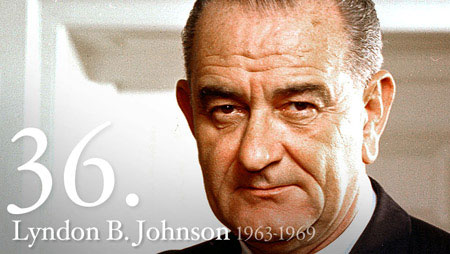
Source: lyndonbjohnon, The White House
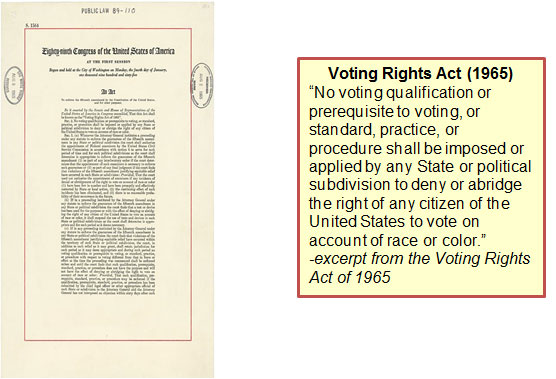
Source: Voting Rights Act (1965), Our Documents
Click on the link below to read President Johnson's speech on March 15, 1965, urging Congress to pass the Voting Rights Act of 1965. You can view Johnson delivering the speech by clicking on the video screen to the right of the speech transcript.
![]() President Johnson Urges Congress to Support Voting Rights
President Johnson Urges Congress to Support Voting Rights
These amendments and congressional acts are examples of ways that citizens can participate in the democratic process. Woman suffragists, civil rights protesters, and student protesters all used the democratic process to secure their political power.
Sources for images used in the interactive, are as follows: